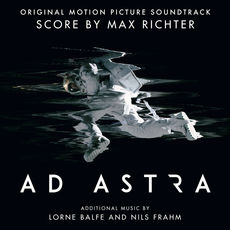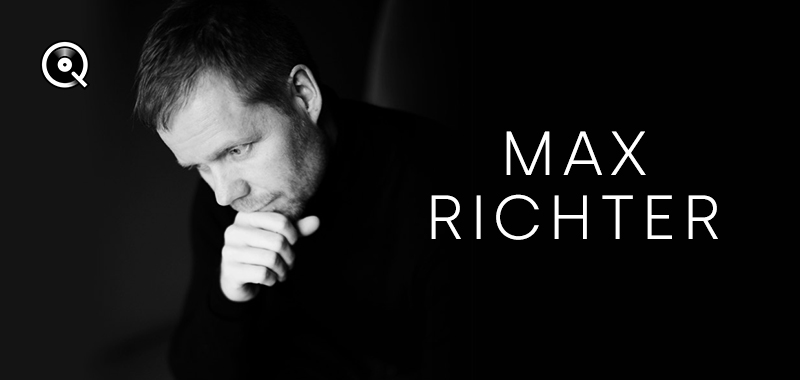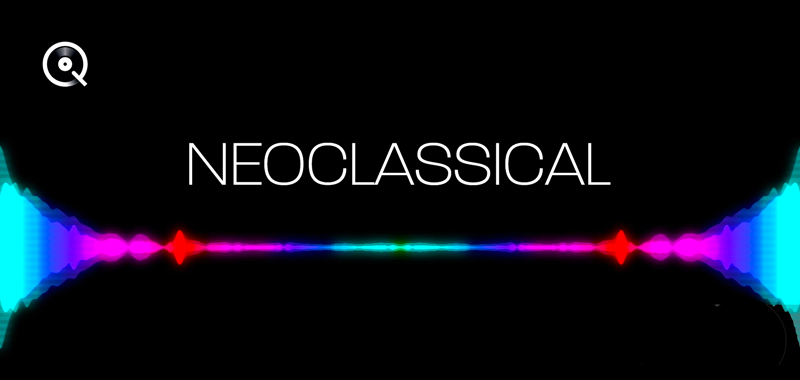With his music, Max Richter aims to set the world on a better path. It sounds ambitious, but in reality it’s more that he simply couldn’t do anything else. For this Englishman born in a small village in Lower Saxony, Germany, music has been an almost pathological compulsion for as long as he can remember. “I started composing before I knew what composing was. As a kid of five or six, I always had tunes going around in my head that I was sort of reconfiguring, almost like a child playing with Lego. I was always doing it but didn’t realise that it was something called composing. It was almost a subconscious thing that I became aware I’d been doing, much later on.”
Naturally hypersensitive to sound, young Max Richter, who grew up in Bedfordshire, north of London, felt the effects of music more physically than others did. And, he reasoned, if it made him feel good, surely it must do the same for others. In the mid-80s, the globetrotter made his way to Scotland, to the prestigious University of Edinburgh, in the city that he now considers “home”, before joining the Royal Academy of Music in London. But it was in Italy that Max Richter would really widen his musical horizons. He went to Florence to study with Luciano Berio, Italian pioneer of electroacoustic music and creator of the Studio di Fonologia musicale, a kind of Italian GRM. Berio was interested in musique concrète, both serial and electronic, in the style of the works of Karlheinz Stockhausen and John Cage.
Fascinated by The Beatles and Bach, "his twin stars”, but also by Kraftwerk, who won him over to electronic music with the bassline on Autobahn (“It was like being struck by lightning”), the Englishman was dazzled by Berio's brilliant thinking. "I had not really encountered anyone like him before. When I showed him a score of mine once, it felt as though he was reading my mind, which is a bit scary because he managed to see what was on the page but also what I meant when I wrote it. Maybe I was succeeding or failing but he could read the intention behind all of my scribbles, which was amazing.”
Diving into English electro
This Italian education brought him out of the straitjacket of the conservatory and, on his return to England, he formed his first group, Piano Circus. This ensemble of six pianists originally came together to play Steve Reich's famous piece, Six Pianos, and went on to produce a series of records for Argo/Decca. But it was around then that Richter felt the need to make a change. He quit the venture to join Future Sound Of London on their album Dead Cities in 1996. The legendary Mancunian electronic duo of Garry Cobain and Brian Dougans, who had hired him as a pianist, was charmed by his personality and gave him more creative room than he had expected. The album even boasts a title, a splendid ambient track entitled… Max. Six years later, in 2002, after freelancing for producer Roni Size, who was then busy shaking up drum'n'bass, Richter returned as mixer, co-producer and co-writer on FSOL's next album, The Isness.
That same year, he made his first attempt at a solo album with Memoryhouse. That record was, as ever, the product of the meanderings of a brain that was constantly working on and rearranging music. And, of course, it was about what made him feel good. "I wrote these songs to put my mind at rest, they just had to come out. I didn't even know if they would ever be performed by musicians." At the time, in 1998-99, the news all over the world was broadcasting images from the conflict in Kosovo, and several tracks on the album refer to it (Sarajevo, Arbenita and Last Days). The album, recorded with the BBC Philharmonic Orchestra, also contains the masterpiece November. Poignant and exhilarating, twelve years later it would be taken up as the theme for Damon Lindelof's splendid HBO series, The Leftovers, under the title The Departure Suite. This record was a milestone for what would come to be known as neoclassical music, with electronic influences like the fugitive warp-esque beat on Untitled (Figures) or the drone on Garden (1973)/Interior alongside John Cage's voice declaiming a poem.
But at the time, the record went unnoticed. It received no press, there were no concerts (the album would be performed live for the first time in 2014 at the Barbican Centre): but he got excellent feedback from his fellow composers. Far from being discouraged, Richter began work on a second album, The Blue Notebooks, this time inspired by the Gulf War. There was no pressure: just a feeling of great freedom. “When that happened, I felt, ‘OK, so no-one’s listening to this, that means I can keep doing exactly what I want, no-one cares anyway’ And that’s sort of been my attitude ever since. When The Blue Notebooks came along again there was no budget but I had a label who were interested, FatCat, so I just carried on." Based in Brighton, England, FatCat, which was originally a record store specialising in importing American techno and house, has made a name for itself by putting artists like Sigur Rós, Múm, Animal Collective and Frightened Rabbit on the map.
Simplifying classical language
The Blue Notebooks was an instant hit, and the composer's career suddenly took off. Greater exposure was not the only reason for the success of this record, described as a meditation on the violence of war, notably through the track The Shadow Journal, which he considers a real 'protest song'. Max Richter has created a 'simplification shock'. “I want to compose because I want to talk about something, to convey a message. As a composer, music is the first language that comes to me when I want to evoke something. But on The Blue Notebooks, I deliberately simplified my language. At the conservatory, we grow up with the idea that good music is complex music. Academic music tends to involve a lot of information, which the listener is supposed to deconstruct in a certain way, and then there are so many rules... So I try to make room for the listener, I try to use simple and direct language. Which does not mean that it is simple music: it means that I have worked hard to make it seem simple.”
And this approach works: some tracks have become very popular, such as Vladimir's Blues, which also featured on the soundtrack of The Leftovers, while his "hit" On the Nature of Daylight, a masterpiece praised by critics and the public, has been used in a good fifteen films and series, including Martin Scorsese's Shutter Island. With this album, Max Richter found the recipe for expressing emotions and messages in music that can be universally understood. This explains why films and television have drawn so much from his catalogue. As a star score-writer in the US audiovisual industry, his compositions have turned up on such films as Waltz with Bashir, Mary Queen of Scots and Ad Astra. He compares this process to solving a puzzle. "It’s a technical discipline and I find it a completely different thing to writing music on its own. In my case, when I’m writing just music, I’m trying to give the absolute total picture or the maximum intensity of that idea to the listener. If you did that in the cinema, you wouldn’t have a film. It would be as though you’ve gone to a cinema just to hear a record playing", he chuckles.
In 2012, his talents as a populariser led him to revisit Vivaldi's Four Seasons, whose over-use in advertising had, he thought, rendered the music unlistenable for the general public. He removed 75%, keeping only the best known passages and immersing the listener in a contemplation of Vivaldi's work. In any case, for Richter, whether he is writing soundtracks, remixes or personal compositions, the purpose is always the same: it's about expressing something, conveying "feelings, history and attitudes”. "Music is one of the dominant ways of experiencing being alive and so in a way, it’s more than just hearing. It’s about articulating feelings, stories and attitudes. I also feel as though an album or a piece of music almost has a sense of place inside it if it’s good. I’m trying to get towards a situation of give and take. That’s why I leave a lot of space in the music that I write. I want my music to become a place for the listener to walk around in and find their own way around. For me, that’s what is important and hopefully that’s what people find the opportunity to do in my work.”
A committed therapist
Richter's 2015 album Sleep was an 8-hour lullaby for which he consulted a neuroscientist specialising in sleep - the objective was to heal the listener. Finding a place for the listener, on the other hand, is the driving idea of his audiovisual project Voices, which was launched in 2020 with visual artist and director Yulia Mahr, with whom he has been with for 30 years. The concept of Voices, a musical work conceived of a place for reflection and based on the aspirations of the 1948 Declaration of Human Rights, is eminently political. But its message is not conveyed in words: Voices contains no voices. It is through music that Max Richter tries to "build a better world”, introducing a whole procession of positive emotions in long passages that flit between ambient and neoclassical. As a student of Brian Eno, one of his most important influences, Max Richter builds a series of absolutely fascinating meditative sequences. These are almost more therapeutic than musical, as if the composer had found the musical frequency of peace and contentment. This record is exactly what the Covid-scarred world needed.
In 2021, the composer, regretting the disappearance of political criticism from his music in recent decades, took up a social message again with his new album Exiles. For this new project, he teamed up with one of the most iconoclastic orchestras of the moment, the Baltic Sea Orchestra, which brings together musicians from countries surrounding the Baltic Sea, crossing the old borders between East and West, and playing from memory, without a score. The album consists of orchestral versions of older songs by Max Richter (excerpts from Infra, Waltz with Bashir and The Blue Notebooks) and others from the soundtrack of Sol León Paul Lightfoot’s ballet, Singular Odyssey, whose soundtrack he wrote in 2017, as a “reflection on travel and transformation”. With the migrant crisis in mind, Richter creates a work that brilliantly straddles the physical and the emotional with touches like the repetitive motif of the piece ‘Exiles’ which symbolises walking, movement, exodus. This record is still perfectly in step with the times. Max Richter, one of the most politically committed artists in the music world, wouldn’t want, much less know how, to do anything else: « It’s like Nina Simone said: ‘An artist’s duty … is to reflect the times.’ »




















